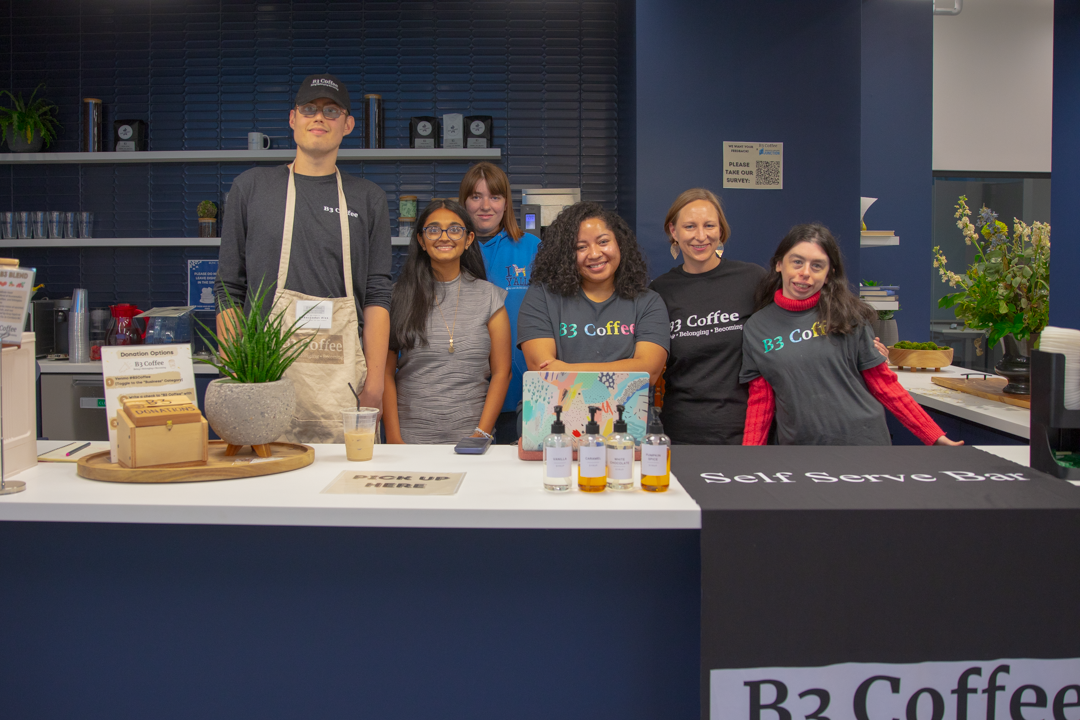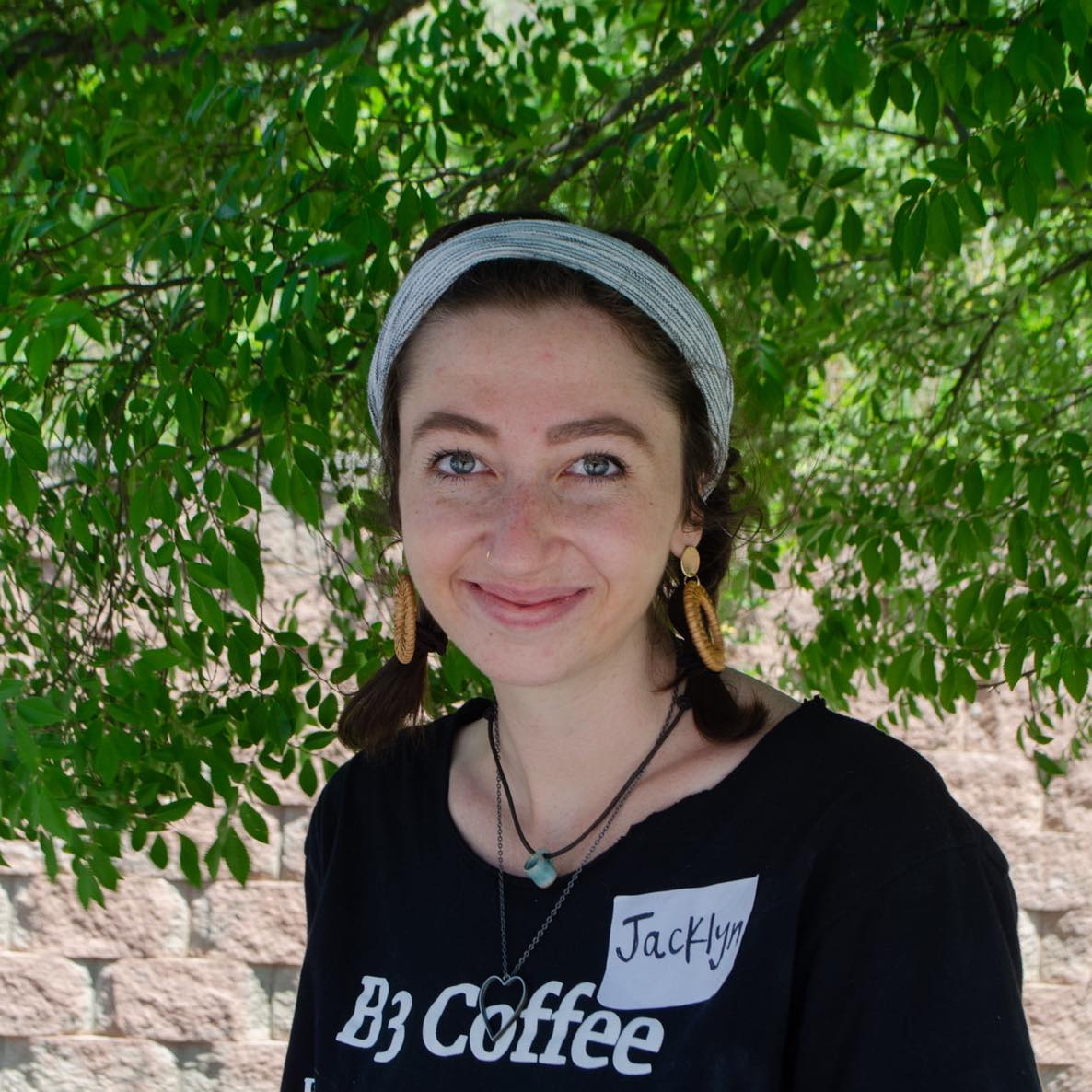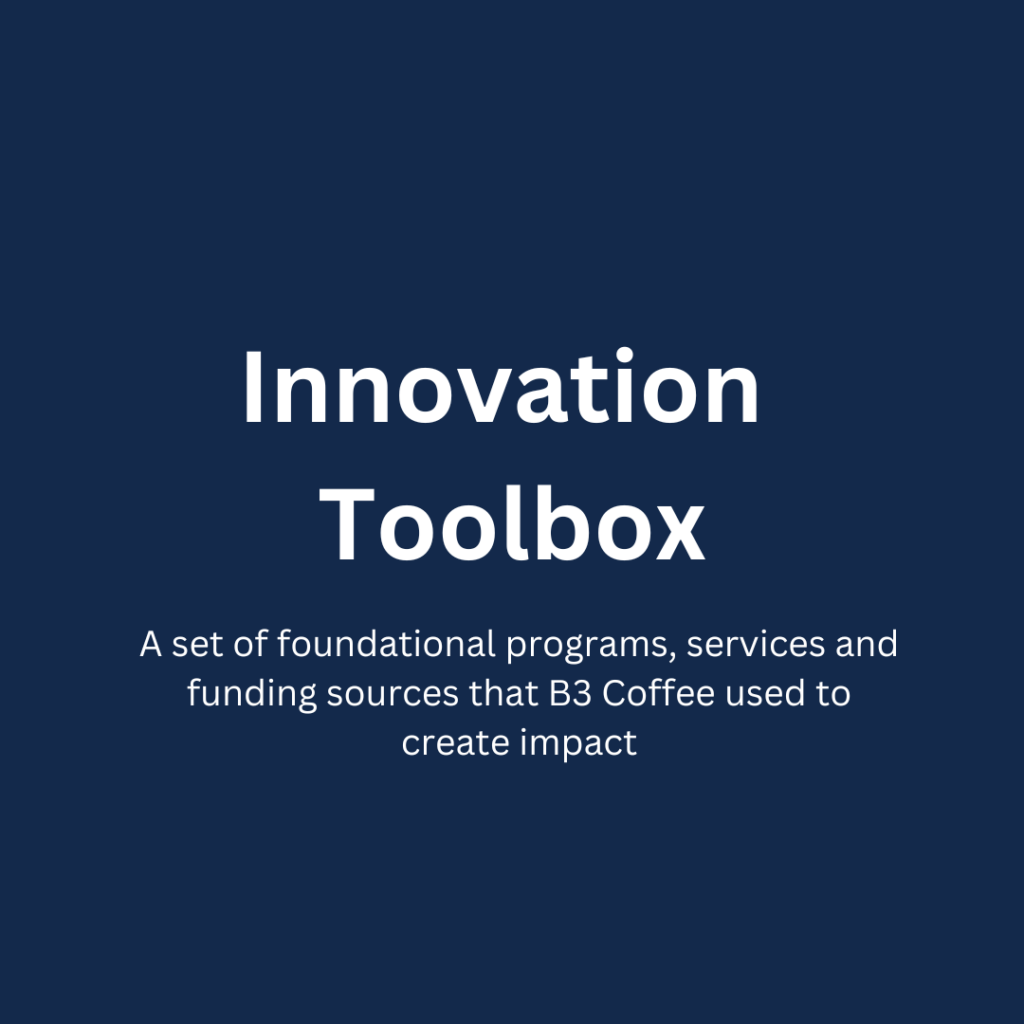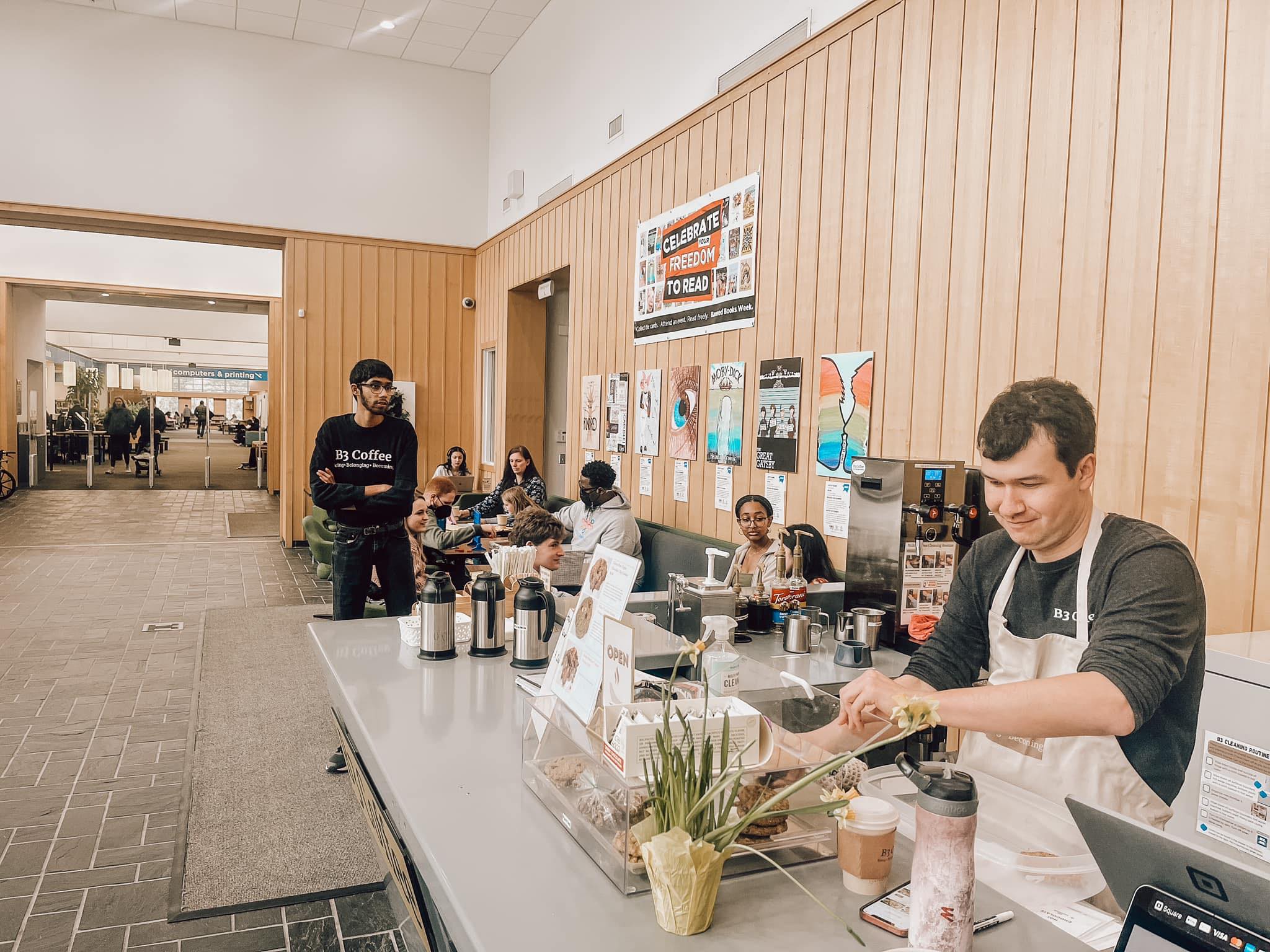

UNC-affiliated startup B3 Coffee serves up more than tasty lattes and cold brews. The nonprofit uses pop-up coffee stands, social communities, internship programs, and skill-building courses to create social connections and employment opportunities for the disability community.

You step to the front of the line at a coffee kiosk to order a cup of your favorite brew. But before you can say “iced mocha” or “chai latte,” the employee behind the counter—whom you quickly realize can’t speak—hands you a card to fill out. For most coffee shops or restaurants, having someone who can’t speak take orders isn’t a challenge they’d take on. However, at B3 Coffee—a nonprofit that uses coffee to provide social and vocational opportunities for people of all abilities—it’s embraced as an opportunity.
“We have one non-speaking member who was a paid intern and wanted to take orders, so we experimented with workarounds,” said Jacklyn Boheler, co-founder and executive director of B3 Coffee. “We started flipping the system, and rather than asking the customer if they’d like syrup or what kind of milk they’d prefer, the member would give the customer a visual order card so that they could fill out their own preferences. We could eliminate the need for spoken communication and still facilitate meaningful exchanges.”
Such moments illustrate why B3 is more than just a coffee shop. Beyond the lattes and espressos, it serves up social support, life skills and workforce readiness. B3’s four-pronged model—pop-up coffee stands, an active social community, a library kiosk for transitional employment and community programs—uses coffee as a common denominator to pursue disability justice, allyship and inclusion.
Boheler co-founded B3 Coffee (“B3” stands for “Being, Belonging, and Becoming”) in 2020 with fellow graduate students Greg Boheler (now her spouse) and Hannah Steen, while earning her master’s degree in occupational therapy at UNC-Chapel Hill. She initially thought the venture would remain a pop-up coffee stand on campus. After all, she’d seen firsthand how coffee could bring people together while working as a Carolina undergraduate student at the on-campus Starbucks—a place that she said became her sanctuary for studying, friendships and belonging. She wanted to build a similar sense of community among people with and without disabilities at B3.
Today, the venture still hosts plenty of pop-up coffee stands. B3 offers coffee service and catering for special events at co-working spaces, schools, churches, conferences or other organizations across the Triangle region. But when COVID-19 forced the nonprofit to launch an online community to reach those with no other social connections during the pandemic, B3 began to build what is now an active group of 300 members who participate both in person and virtually. Every week, B3 hosts a fun community-building Zoom call, during which members discuss weekly challenge questions structured around a topic (e.g., “What do you love about fall?”), share organizational and personal announcements, and help make decisions about the future direction of the organization. “We’ve continued online calls post-pandemic because they expand equitable access for many people who have transportation barriers related to intellectual and developmental disabilities,” said Boheler. “Our online community reaches people whom we wouldn’t otherwise. Whether participating in person or online, our members are involved at every level of decision making about B3’s operations.”
B3’s in-person events are also popular. Every Sunday, its members participate in an in-person, casual coffee hour with games, crafts, coloring and other social activities at its kiosk located at the Chapel Hill Public Library. On top of the weekly meet-ups, B3 hosts a variety of seasonal social events for members.
While connecting socially is important for all people, Boheler says it’s particularly vital for those with disabilities who enter young adulthood and experience social and economic marginalization. “As individuals with disabilities graduate from high school, many experience what is known as a service cliff, or a drop-off in services,” explained Boheler. “Rather than their services and support systems being centralized within the school, resources are spread all over the community, and there are more barriers to equitable access. The resources tend to be disjointed, and there are different funding mechanisms and eligibility criteria for every organization, so it’s very complicated and confusing to navigate.”
One key aspect of the service cliff is a lack of employment opportunities—a challenge that B3 Coffee combats with the coffee kiosk and semester-long, paid internship program it runs at the library. The kiosk is open three days a week as a transitional employment model for people with and without disabilities. Boheler said that its kiosk helps eliminate misconceptions around disabilities and the discomfort that employers have with the idea of differences. “Employers tend to be pretty resistant to the idea of hiring someone with a disability, especially if they don’t know a disabled person,” she said. “B3 increases the visibility of the disability community, which is important for breaking down stigma. We provide spaces for disabled people to be represented in a dignified way.”


Photo courtesy of B3 Coffee
The internship, which provides work and life skills and the opportunity for service and occupational shadowing hours, involves working one kiosk shift per week, participating in allyship and self-advocacy trainings, and taking B3’s Belonging in the Workplace class. “Our Belonging in the Workplace program covers work-readiness topics, including how to create a resume and navigate tricky communication scenarios,” said Boheler. “We talk about what it means to be professional, discuss self-advocacy in the workplace and explain how to access accommodations. It’s all interactive. We role-play situations that happen at the kiosk and problem solve them together so that there is an educational component.”
Once interns complete the program, B3 works to connect them to employers, with the understanding that not everyone wants to be a barista forever and that some interns plan to use the skills they acquire to move into other fields. Participants develop a portfolio about themselves that includes their strengths, support needs, interests and a resume that they can share to future employers or job coaches.
Beyond the Belonging in the Workplace class, B3 offers the Living Your Best Life Course, which explores different areas of skill and activity for adults such as cooking, personal wellness, mental health, and what it means to be in a healthy relationship. In addition, its newest program called Navigating the Digital World introduces participants to skills like basic email etiquette and using technologies like Google calendar, weather apps, and personal assistant devices like Alexa.
People without disabilities are often the ones who benefit most from B3’s programs. “Allies are looking for a journey, and they want to become more inclusive,” said Boheler, who noted that some participants in the internship program include students from UNC-Chapel Hill’s School of Social Work and Duke University’s occupational therapy and human development and family studies programs who need to complete a practicum or field work. “Many of our allies are preparing to enter human service professions, whether it’s teaching, social work or occupational therapy. So, they are looking for an immersive experience in disability culture and for personal relationships with people with disabilities, which is really important when you’re going to enter a clinical setting or any kind of service setting where there’s an inherent power dynamic between people with and without disabilities.”
To eliminate the historically engrained power structure, B3 takes a non-hierarchical approach. “We always have a person with a disability and a person who identifies as an ally working the stand together in equal but distinct roles,” said Boheler. “One would be customer service and one would be barista.”

The non-hierarchical environment brings fresh perspectives, particulary for allies. “Traditionally, the focus is always on, ‘How do we fix or change people with disabilities?’ That’s what you see at most nonprofits and service-oriented organizations. And for B3, it’s quite the opposite,” said Boheler. “We focus on how to support people to be their authentic selves and thrive in community. Many of our allies experience a major paradigm shift when they participate in B3. It’s mind boggling when they realize they don’t have to see this person in terms of deficits and that they can learn something from them.”
When B3 started as a pop-up stand on campus, funding for equipment came from a GoFundMe campaign. “Since incorporating as a nonprofit, we’ve had to create new revenue streams, so we apply for grants,” said Boheler. The grants—which include those from NEXT for AUTISM, the Kenan-Biddle Partnership Grant, the Strowd Roses Grant and Piedmont Energy—primarily support B3’s programs and classes on workplace readiness, life skills and the technology. The nonprofit also receives private donations.
“Our kiosk generates revenue, and we charge a service fee for the events we’re invited to,” said Boheler. “It’s self-sustaining and goes right back into paying people.” Program funding also comes from First in Families, a local nonprofit that helps people with disabilities and their families, and Alliance Health, a managed care organization that serves people with intellectual and developmental disabilities across six North Carolina counties. “We cover many of our members’ program fees through a funding stream from Alliance Health, so that was a big milestone,” said Boheler.
Boheler’s initial vision for B3’s location looked different than today’s version. “I thought we were just going to be a pop-up coffee stand that might become a brick-and-mortar shop one day, if we were lucky,” she said. “But now, our goal is not to create a brick-and-mortar shop. We would rather focus our efforts on educating employers in the community to see the value of our members, and refer our members to them for long-term employment, because that’s what systemic change looks like.”
B3’s programming takes place at the Holy Trinity Lutheran Church in Chapel Hill, while its workforce development program and internship take shape at the Chapel Hill Public Library. And pop-up and catering opportunities have the venture showing up wherever opportunity calls.

“Our location is based on what opportunities come along and who the allies in our community are,” said Boheler. “We’ve taken opportunities as they arose and as organizations approached us with a desire to support our mission.” And while Boheler said that B3 will continue partnerships that offer programs and classes in the community, she also envisons eventually establishing a home base for its program and members. “We hope one day to have a community center that has programs and social events happening on a daily basis,” said Boheler. “And we hope that community center will be in a central location on public bus lines, where our members can experience true community integration.”
In 2023, B3 began exploring a partnership with Innovate Carolina, UNC-Chapel Hill’s central innovation, entrepreneurship and economic development team. The partnership involves hosting a pop-up coffee service at the Innovate Carolina Junction, a co-working space and innovation community located in downtown Chapel Hill. “Our collaboration with the Innovate Carolina Junction will allow us to nurture our partnerships with UNC, connect with the university community, and advance our values of disability justice, allyship and inclusion,” said Boheler. “We’re also trialing the concept of a full-service bar, so that’s what we hope to build up to if there’s enough traffic to sustain it. That would allow us to provide more long-term employment opportunities, since our Chapel Hill Library location is more transitional.”
With no full-time staff—and only four part-time employees—B3 relies on volunteers, interns and active members of the community. Boheler’s day job is a project manager at UNC-Chapel Hill’s TEACCH Austism Program, so her work with B3 comes on top of her full-time responsibilities.
“In the beginning, I took the lead on the pop-ups, but as we expanded programs and social aspects, it became too much for me,” said Boheler. “So we hired a pop-up manager and a pop-up coordinator, which allows me to focus on areas that I’m best at: the programming and accessibility-related offerings.”
B3 didn’t have to search far for talent. Greg Boheler, Jacklyn’s spouse, is chief development officer and leads grant writing, financial management, and program development. Pop-up staff include the passionate parent of a B3 member and an advocacy contact that Boheler met via the region’s close-knit disability community. Three of four of B3’s part-time staff identify as neurodivergent.
Boheler didn’t take entrepreneurship courses as a student, but has since leaned on numerous programs, her occupational therapy training, and the extensive local disability community to build entrepreneurial know-how. “My strategy has been centering the community that I’m trying to impact, because I adhere to the idea of ‘nothing about us without us,’ which originated from the disability rights movement,” she said. “I’ve learned from a very robust network of people who want to help. A lot of parents will step up, and a lot of professors at UNC work in the field of special education. It’s a unique bubble of resources that I was able to tap into.”
Two entrepreneurial resources included a SCORE mentor and Launch Chapel Hill, a startup accelerator run as a collaboration between UNC-Chapel Hill, the Town of Chapel Hill and Orange County. “In the beginning, my learning focused on business-model generation,” said Boheler. “I worked with a free mentor through the SCORE program, which helped with the initial brainstorming of our four-prong concept. Launch Chapel Hill helped us articulate our offerings and brands.” The B3 team also worked with the UNC School of Law’s Community Development Law Clinic. “The UNC law clinic helped us with our articles of incorporation, the startup bylaws, and the paperwork needed to form the nonprofit, and then also compliance with the different regulations of operating a nonprofit.”
Boheler points to the mentorship of Dana Hanson-Baldauf, an adjunct professor at the UNC School of Information and Library Science, as a defining and enduring entrepreneurial influenence. “When I was an undergrad, Dana Hansen-Baldauf introduced me to the idea of the service cliff and taught me about self-determination theory, which still closely guides my work today,” she said. “I don’t think I would have started that first little pop-up stand without her encouragement.”